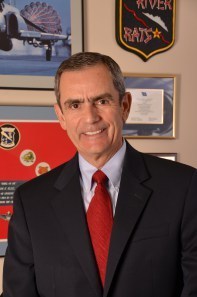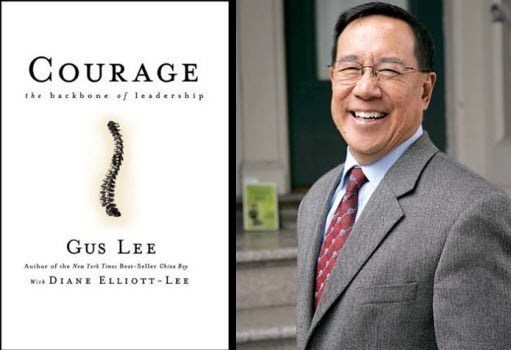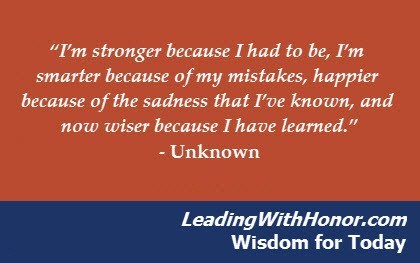Lee Ellis's Blog, page 333
June 25, 2014
The Latest Recommendation from Lee Ellis’ Bookshelf – “Courage” by Gus Lee
In this guide to doing the right thing, ethicist Gus Lee presents a self-help approach to solving hard-edged problems.
The key to effective leadership, he argues, is “principled conduct under pressure”—in short, courage. While courage is hardly the one-size-fits-all magic bullet that Lee envisions, much of his advice is valuable, particularly that dealing with communication, the thorniest management issue of all. The book is built around extended anecdotes about executives facing tough personnel decisions and having to confront their habits such as “avoidant communication.”
Learn More about Courage by Gus Lee. Have you read this book? If so, please share.


June 24, 2014
Freeing the Captives—How to Confront Your Personal Leadership Barriers (Part 1)
By Lee Ellis
The release of Bowe Bergdahl has been a hot item in the news recently, and I’ve had several interviews on regional and national news media about what it’s like to come home after being a POW for five and a half years. Our capture situation in Vietnam was quite different and my time in solitary confinement was short, so I’ve focused more on what it was like to return after years of poor diet, little news, periodic abuse, and isolation from family and society.
I’m glad Bowe Bergdahl is back home, and I know his family is relieved. Time will tell what the military sorts out about his capture and military service, but the discussion about him, as well as the annual celebration of our nation’s independence, has reminded me of why I’m so passionate about helping free the captives in my consulting, writing, and speaking.
What’s Holding You Back?
I’m enthusiastically focused on helping people find the freedom and courage to grow by breaking away from the shackles that are holding them back. My observation and experience over the last forty years training hundreds of military and business leaders is that we all have mindsets, habits, and behaviors that inhibit our growth as individuals and leaders.
“We all need more freedom from these barriers, and many of these shackles come from our feelings of insecurity.”
Consider the two responses below that cause us to get in our own way, restrict us from achieving our potential, and yield major external repercussions.
False pride maximizes self and minimizes others. This unhealthy response to our insecurity is a mindset of superiority that manifests as an ego-protecting pose typically based in domination, control, and perfectionism rather than authentic humility. False pride leads to self-centeredness and makes it difficult to acknowledge the good ideas and achievements of others. Leaders imprisoned by their ego often feel threatened by those who don’t agree with them, and soon there’s a graveyard nearby where they bury unwelcome messengers whose words of truth shine light on their dark side.
False humility minimizes self and maximizes others. Some people respond to their insecurities by going in the opposite direction—living in a negative self-image in one or more areas. Their negative personal perception produces a mindset that has boxed them inside limits that are more akin to self-imposed incarceration.
You may be thinking, “I can see this in others and maybe a little in myself, but it sounds pretty deep and psychological. How can we free ourselves and others from these negative patterns?”
“Professional help will be needed for some situations, but much can be done by remembering a single principle—the truth can set you free. The problem here is that a lie is operating rather than the truth.”
Identifying the Lie
In the 2011 movie, The Help, actress Viola Davis’ character lovingly reminds Mae Mobley, a little two-year old, about her self-worth –
If you think about it, you’ll see that both of the career/life inhibiting responses above are undergirded by a lie about our self-worth. It’s true that we’re all flawed, but we have great value, too. It requires a healthy balance to live with these two paradoxical statements and resist living the lie of low self-worth.
“Notice that both the responses above are grounded in fear—the emotion that exercises powerful control over our hearts and minds.”
Gaining Freedom for Yourself and Others
Knowing and believing the truth about ourselves is the antidote to lies and opens the pathway to freedom. Here are two ways to embrace the truth –
Welcome courageous confrontation. Remember that all development begins with self-awareness. Being honest with ourselves can be difficult because denial and rationalization are often normal protective strategies for a pose. Do you have the courage to ask someone for honest feedback—either one-on-one or by having a coach or consultant do a 360 assessment on your leadership behaviors? Be willing to confront yourself and break free from the lies holding you back. Likewise, it can be very rewarding to be a warrior for freedom for others. Confront the next generation of leaders to help them assess where they need to break free too.
Give and accept courageous support and affirmation. Those locked in false humility need truth of their value and potential.As their leader, peer, or friend, we can be the bearers of that good news. Years ago, I remember being affirmed by two friends about my value and worth. Initially I resisted and tried to refute their comments, but their sincerity and their personal loyalty convinced me that my perspective was a lie. They were revealing truth that I needed in order to move to the next level in my leadership. It was powerful and liberating to have that courageous support and affirmation.
In this season of celebrating freedom and independence, the key message here is that honorable leaders acquire the courage to confront and be confronted and the courage to support and affirm. Both approaches are needed to bring the truth that can set ourselves and others free to grow to the next level of performance.
Do you have the courage and humility to find out the truth about your leadership and then encourage others in their leadership? Your growth has much larger implications than you can imagine. In part 2 of this article we’ll explore the broad societal possibilities when we have a nation full of confident, valuable leaders.
LE
Related Articles:


June 23, 2014
What Are Some Career Blindspots That Can Potentially Lead to Career Injuries? – See the 6 Things to Consider
 Lee Ellis receives the following question regularly -
Lee Ellis receives the following question regularly -
Question: “Sometimes, what you don’t see, know, or do can hurt you in the workplace and hamper your career prospects. What are some ‘career blindspots’ that can potentially lead to blindsiding and career injuries?”
Answer: As you know, many times it comes from just being an unhealthy dysfunctional person. Healthy functional people rarely have career blind spots and derailing behaviors. They have them early but learn quickly and move on. Here are some blindspots to consider –
1. Insecurities that cause us to get in our own way in life/work and especially as leaders. When you’re insecure, you don’t act out of real confidence in yourself and that never works. Typical examples are political back stabbing; self-serving rather than team serving behaviors; fear driven control (over-control and micromanaging) rather than servant leadership.
2. Poor emotional intelligence as indicated by or responding inappropriately in a situation. An example would be saying the wrong thing at the wrong time, not being aware of what’s really happening in the moment.
3. Character failures–which are more often driven by fear. Afraid you will not be taken care of, so you do something unethical. Afraid you will look bad if the truth is known so you deceive, lie, etc. to protect your reputation. This rarely works over the long haul.
4. Baggage from the past especially is one of the biggest, and it causes unhealthy responses. For example, problems with authority, inability to trust, and fear of conflict which causes the inability to have difficult conversations. These also usually come back to fear – fear of some pain from the past that is so strong that it’s still controlling your behavioral responses.
5. Out of balance between results and relationships (mission and people). Leaders must be able to do both to some level. We are naturally gifted toward one or the other, but we can’t just focus on one or the other.
6. Incompetence in your field. You see this less often but it happens, and it’s usually due to a mis-match between your type of work and your passion/talents.
You can also view or download a SlideShare Presentation of this FAQ at this link.
Do you agree with Lee’s answer? What additional insights can you provide on the topic? Please share your comments below.


June 20, 2014
Leading with Honor “Wisdom for Today” for Friday, June 20th
“I’m stronger because I had to be, I’m smarter because of my mistakes, happier because of the sadness that I’ve known, and now wiser because I have learned.” – Unknown


June 19, 2014
Why Character and Courage are the Right Traits to Lead – Lee Ellis’ Interview on the Brian Oxman Show
Lee Ellis shares his in-depth, personal comments on the Brian Oxman Show regarding his first return visit to Vietnam, the analysis of the Bowe Bergdahl POW swap, and more.
Brian is a former LA defense attorney and has practiced law for more than 30 years. He was a Professor of Law at Irvine University School of Law, moving on to the role of radio talk show host. Brian was an adviser to Governor Jerry Brown and represented Michael Jackson in the criminal trial in 2005.
Please listen and share your comments –
Learn more about Lee’s book, Leading with Honor, at www.LeadingWithHonor.com.


June 18, 2014
The First Moments of Lee’s POW Capture – Watch the Interview Clip
In dramatic detail, Lee shares how his POW story begins with his shoot down and capture over enemy territory. If you’ve never heard Lee describe these first moments, watch and share –
Learn More about Lee’s story and leadership lesson learned at www.LeadingWithHonor.com.


June 17, 2014
How to Manage Stress After a Transforming Life Event – Watch the Latest CNN Interview with Lee Ellis
Lee appeared on CNN again last Saturday to discuss more about the ongoing behavioral effects of stress related to Bowe Bergdahl (or anyone who has experienced a life-changing event).
How does someone effectively manage long-term stress? Watch this interview, and share it with others –
Learn More about Lee’s POW Story and Leadership Lessons Learned at www.LeadingWithHonor.com.


June 16, 2014
Human Resources, Training, and Consulting Professionals – Join Lee as part of HR.com’s “Developing Organizational Leadership Capabilities Virtual Conference” Series on Monday, July 14th at 11:00am EST
 The most effective leadership is to achieve the mission (get results) and take care of the people (build relationships). But the reality is that most people are naturally equipped to do only one of these well.
The most effective leadership is to achieve the mission (get results) and take care of the people (build relationships). But the reality is that most people are naturally equipped to do only one of these well.
In this online webinar session sponsored by HR.com, Lee will review eight categories (factors) of natural behavior and see how the associated traits drive us results and relationships.
Registration is free— Click to Learn More


June 12, 2014
Federal News Radio Interview – “Courageous Leadership Inspires Former POW to Overcome Fear, Lead Others”
Lee often talks about fears keeping us from reaching our full potential as leaders. As many of you know, he understands fear firsthand based on his Vietnam POW experience.
Recently, Federal News Radio provided a great written article and audio interview on Lee’s perspective on today’s leadership challenges and how many leaders are choosing to courageously lead the right way.
Please Listen and share your thoughts –


June 10, 2014
A Dose of Leadership Wisdom – A Recent Radio Interview Clip from AM560 Talk Radio Chicago – Please Share Your Comments
Lee spoke with the AM560 Talk Radio Chicago recently about some leadership lessons learned in his life, POW experience, and career. If you need a dose of wisdom this week, click and listen to their conversation –









